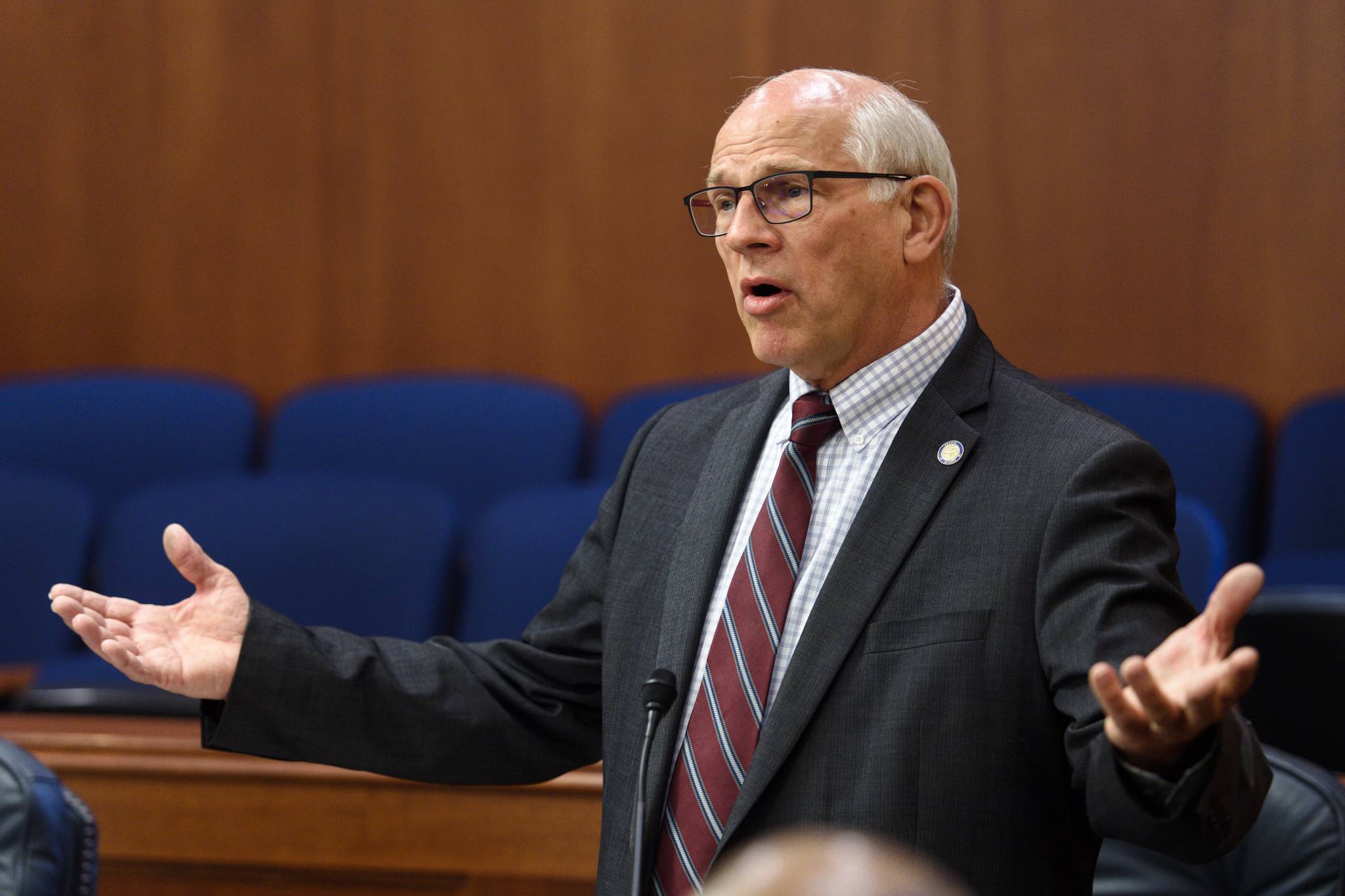Blame it on FedEx.
Sen. Mike Shower, R-Wasilla, is currently away from the Alaska Legislature due to his regular job as a FedEx pilot, and would have been the pivotal vote Tuesday to move a bill out of the Alaska Senate that proposed a $3,000 Permanent Fund Dividend.
Senators voted 10-8 to approve the amended bill, Senate Bill 1002, but it wasn’t enough. To approve a bill, the House or Senate has to have a majority of its total members — not just those who are present — vote yes. Amendments to a bill only require a majority of those present to pass.
SB 1002 originally proposed a $1,600 PFD, but an amendment introduced and approved Tuesday bumped that up to a full $3,000 dividend. Shower was one of the sponsors of the amendment to make the PFD $3,000. Shower’s office did not return interview requests but others expect Shower to be back in the Capitol on Friday. The Senate is scheduled to reconvene at 11 a.m. Wednesday, and could introduce a bill then that might be able to make it to the floor by Friday.
There were two main competing arguments on the floor. One was that the state should follow the statutory formula and pay a full dividend to qualified Alaskans. The other was that the state should be cognizant that oil revenues aren’t what they used to be and that they should be careful to preserve the Permanent Fund for future generations as much as possible.
Sen. Peter Micciche, R-Soldotna, appeared to be on both sides of that argument. He said on the floor that giving voters a full PFD this year would help restore trust in government after the Legislature has cut residents’ PFDs the past three years to help fund government. He said he knows the current formula isn’t realistic long-term, but he wants to see a vote from the people to change the dividend. He said he thinks that can happen next session.
“The reality of it is, a full dividend is not sustainable forever,” Micciche said. “We have to have that discussion, but we’re not ready to have that until next year, with Alaskans.”
[Lawsuit pits role of Legislature against power of governor]
Sen. John Coghill, R-North Pole, voted against the larger PFD. Coghill, 68, said that as a Baby Boomer, he’s been the beneficiary of excellent wages, health care, job opportunities and large PFDs. He said he wants future generations of Alaskans to have similar opportunities.
“This generation should not go down with the epitaph, ‘We took it all and left nothing for the next generation,’” he said. “If (the PFD’s) not sustainable, that’s what will happen.”
Now what?
Following Tuesday’s floor session, senators and staff members were zipping around the hallway outside the floor. Sen. Bert Stedman, R-Sitka, who championed the original form of the bill containing a $1,600 PFD, said he still thought the Senate could come to an agreement in the final 10 days of session.
“We have discussion amongst ourselves. We have almost two weeks, a week and a half. We have time,” Stedman said, chuckling at skeptical looks from reporters. “It won’t be a unanimous decision.”
Both the Senate Majority and Senate Minority are split on the issue, which has set up the standstill in the body. The Senate Majority is completely split on the issue, as seven of its members voted against the $3,000 PFD and six voted for it Tuesday. Shower would have been the Majority’s seventh vote of approval. Sen. Jesse Kiehl, D-Juneau, was the only one in the Senate Minority to vote against the $3,000 total.
Of those who voted to approve the $3,000 dividend, five were Democrats and five were Republicans.
It seems unlikely that PFD legislation will come from the House, as Speaker of the House Bryce Edgmon issued a statement Tuesday afternoon saying he wants the Legislature to pass a budget first and worry about the PFD later.
“Debate over the amount of this year’s Permanent Fund Dividend is consuming the Legislature,” Edgmon said in his statement.
Edgmon told the Associated Press this week that he expects another special session if the Legislature passes something other than a full dividend.
Gov. Mike Dunleavy, who pledged to veto the bill if it had a $1,600 PFD, praised the 10 senators who voted yes on the full dividend, even taking the time to tweet individually at all of them. He also tweeted that “anything short of a full PFD as defined by law is not acceptable.”
Anything short of a full PFD as defined by the law is not acceptable. Alaskans have demanded politicians stop using the PFD as a political piggy bank. #akleg #akgov (2/2)— Governor Mike Dunleavy (@GovDunleavy) June 4, 2019
Sen. Natasha von Imhof, R-Anchorage, is the co-chair of the Senate Finance Committee and has spoken passionately throughout session about the dangers of a large dividend. She was once again assertive as she spoke on the floor Tuesday.
“I am in favor of letting people keeping as much of our oil wealth as possible, however $1,600 is a stretch and $3,000 is fiscally irresponsible and unsustainable,” von Imhof said. “Citizens trust us to learn the issues, understand how the government operates, read the reports, listen to the department presentations and trust us to make the best decisions for the long-term health of the state. A $3,000 dividend is not good for the long-term health of the state.”
• Contact reporter Alex McCarthy at amccarthy@juneauempire.com. Follow him on Twitter at @akmccarthy.

